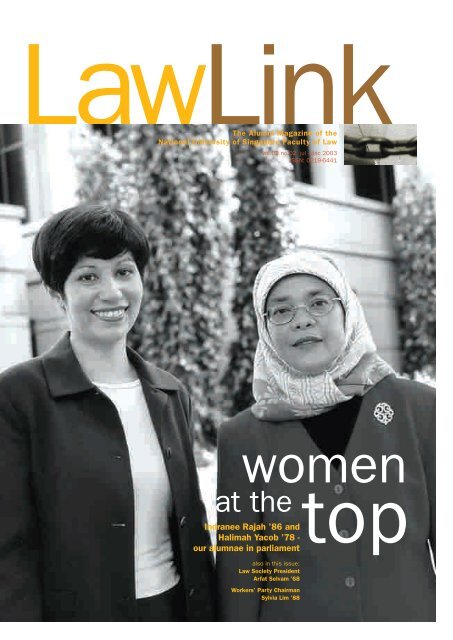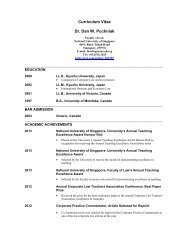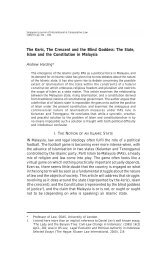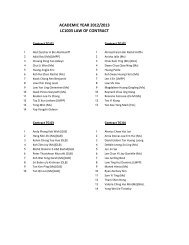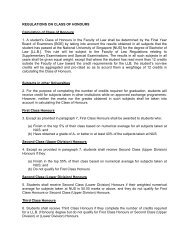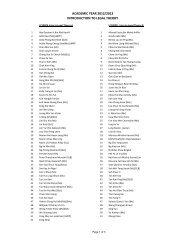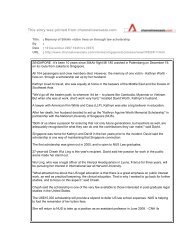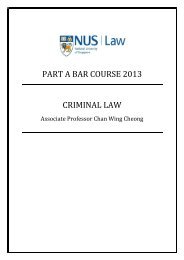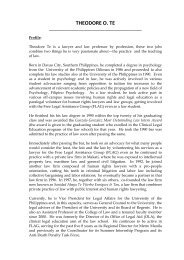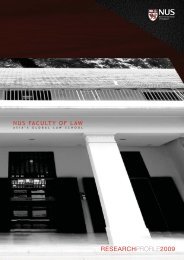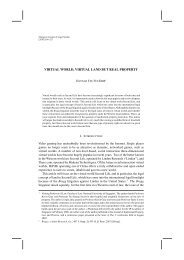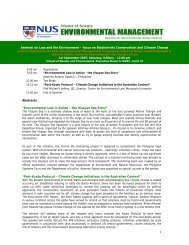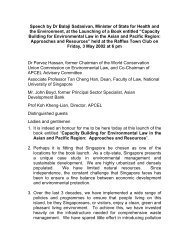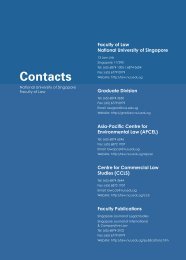Vol 2 No. 2 July - December 2003 - Faculty of Law - National ...
Vol 2 No. 2 July - December 2003 - Faculty of Law - National ...
Vol 2 No. 2 July - December 2003 - Faculty of Law - National ...
- No tags were found...
Create successful ePaper yourself
Turn your PDF publications into a flip-book with our unique Google optimized e-Paper software.
Top LeftPr<strong>of</strong> Stephen Girvin, Dean Tan ChengHan and Pr<strong>of</strong> Bob BeckmanTop RightMPA Director-General Chen Tze Pennpresenting NUS President Pr<strong>of</strong> ShihChoon Fong with the chequeMPAdonates $4m for Pr<strong>of</strong>essorship in Maritime <strong>Law</strong><strong>Law</strong> SchoolDonors07The <strong>Law</strong> <strong>Faculty</strong>’s expanding Maritime <strong>Law</strong> programme received a boost from the Maritime and Port Authority <strong>of</strong>Singapore (MPA), when on 5 June <strong>2003</strong> its Director-General Chen Tze Penn presented NUS President Pr<strong>of</strong> ShihChoon Fong with a cheque for $8m, <strong>of</strong> which $4m was earmarked for the <strong>Faculty</strong> <strong>of</strong> <strong>Law</strong> to establish an MPAPr<strong>of</strong>essorship in Maritime <strong>Law</strong>.Dean Tan Cheng Han ’87 says, "The <strong>Faculty</strong> <strong>of</strong> <strong>Law</strong> is extremely grateful to MPA for its strong and generous support.We plan to use the funds to bring MPA Visiting Pr<strong>of</strong>essors and Distinguished Visitors to NUS to conduct coursesin maritime law for the undergraduate and postgraduate law programmes <strong>of</strong> the <strong>Faculty</strong>, as well as seminars andintensive courses in maritime law for the maritime community and practising lawyers in Singapore."At present, the <strong>Faculty</strong> <strong>of</strong>fers five subjects in the maritime field: Carriage <strong>of</strong> Goods by Sea, Admiralty <strong>Law</strong> & Practice,International Maritime <strong>Law</strong>, The <strong>Law</strong> <strong>of</strong> Marine Insurance, and Ocean <strong>Law</strong> & Policy. In addition, the <strong>Faculty</strong> <strong>of</strong>fersa course in International Commercial Arbitration, which is crucial to Singapore’s goal <strong>of</strong> become a leading maritimearbitration centre. The programmes are currently taught by 3 full-time lecturers: Pr<strong>of</strong>essors Robert Beckman,Stephen Girvin and Alan Tan ’93, as well as 3 adjunct lecturers: Lee Kiat Seng ’89 <strong>of</strong> M/s Wee SweeTeow & Co., Winston Kwek ’90 <strong>of</strong> M/s Rajah & Tann and Neale Gregson <strong>of</strong> M/s Watson, Farley & Williams.The MPA Pr<strong>of</strong>essorship will enable the <strong>Faculty</strong> to <strong>of</strong>fer additional advanced subjects as well as an intensive twotothree-week course in Maritime <strong>Law</strong> during the University holidays for members <strong>of</strong> the maritime legal communityin Singapore. Vice-Dean Robert Beckman elaborates: “Funds from the MPA grant will enable the <strong>Faculty</strong> to bringout several MPA Distinguished Visitors in Maritime <strong>Law</strong> to teach in the first Intensive Course in Maritime <strong>Law</strong>, whichthe <strong>Faculty</strong> plans to <strong>of</strong>fer in June/<strong>July</strong> 2004.”Our first MPA Distinguished Visiting Pr<strong>of</strong>essor will be Pr<strong>of</strong> Robert Force, Director <strong>of</strong> the Maritime <strong>Law</strong> Center atTulane <strong>Law</strong> School, the leading maritime law center in the United States. Pr<strong>of</strong> Force arrives in <strong>December</strong> <strong>2003</strong>,and will be advising the <strong>Faculty</strong> on the feasibility <strong>of</strong> <strong>of</strong>fering a specialised LL.M. degree in Maritime <strong>Law</strong>. He willalso be assisting the <strong>Faculty</strong> in planning the Intensive Course in Maritime <strong>Law</strong>.
womentopat the
Indranee, how far do you think Singapore has come in addressing the challenges facing women in our society?IR: Education and financial independence for women are issues close to my heart. In the course <strong>of</strong> my Meet-The-People sessions I have occasion to meet women who don't speak English and have not progressed beyond primaryschool education. They are, or were, dependent on their spouses or someone else to provide for them but for onereason or another that support has been removed either because the spouse has died, or is in jail, or left themand they don't know how to cope, especially when they have young children. They are a very vulnerable group.Their vulnerability is due to the lack <strong>of</strong> education which in turn affects their ability to earn and provide for themselves.It's nice if someone else can provide for you, but a woman should always be in a position to fend for herself whennecessary. Education is the key.Singapore has come a long way in addressing thechallenges faced by women in our society. To seethis you have to look back 40-50 years. We've doneaway with polygamy, introduced the Women's Charter,have a meritocratic policy. More women work todaythan 40-50 years ago and the wage gap is closing.Women are increasingly holding higher positions inboth the civil service and the private sector. Recentlythe quota on women medical students was abolished.We still have challenges, though. One <strong>of</strong> these isthe perception that it is the woman who is primarilyresponsible for looking after home and family. Workingwomen face a lot <strong>of</strong> challenges. It's tough to be ableto hold down a job and at the same time have afamily. Sometimes a woman is forced to choosebetween her career and family. Ideally she shouldn'thave to choose. Like a man, she ought to be ableto have both. To achieve that, however, it meansshared responsibility.Both <strong>of</strong> you come from modest backgrounds.If adversity builds character, how do you thinkthe younger generation will fare given Singapore'scurrent level <strong>of</strong> affluence?IR: Affluence doesn't mean absence <strong>of</strong> adversity.For example, you could come from a well so do familybut suffer adversity if someone in the immediatefamily dies. The younger generation will fare accordingto the challenges that they encounter - and they areencountering plenty. Our young people are going tohave to figure out how to compete in an increasinglyglobalised world; how to find jobs in the currenteconomic climate, how to cope with the stressesand strains <strong>of</strong> a society that is getting faster andfaster in pace. I have faith in our young Singaporeansthough. I think that when the time <strong>of</strong> testing comes,they will pass the test.HY: I don't think that we should underestimate the capacity <strong>of</strong> our young to adapt and change. We have read aboutgraduates who have taken up jobs as waiters whilst waiting for better things to come along and they are notashamed <strong>of</strong> it. I am proud <strong>of</strong> them for their sense <strong>of</strong> realism and independence. Surely this is better than havingto depend on their parents. We hear horror stories about how some NS boys don't even know how to make theirown drinks or how to sweep the floor. But after two and half years, they adapted and changed. Likewise, many <strong>of</strong>our young study overseas and although they may have maids to do everything for them here, once they are therethey learn very quickly to do everything for themselves. I believe that each generation <strong>of</strong> Singaporeans has thecapacity to define their own path and find their own bearings.The real challenge for Singapore in dealing with the young is how to make them feel that they have a stake here,ensure them that their voice matters and that they can contribute meaningfully to the process <strong>of</strong> shaping Singapore'sfuture. Whilst we continue to attract foreign talent, we must not overlook our own homegrown talentamong the young.
Halimah, you have spent almost your entire working life inthe labour movement. With the current downturn in theeconomy, what do you think are the most important challengesfacing the workforce?HY: The most important challenges facing the labour movementtoday are firstly, how to ensure that enough jobs are createdand secondly, how to help those who are unemployed to securejobs. We have seen wage cuts and a spate <strong>of</strong> retrenchments.These have created great anxieties and insecurity in theworkforce. People live with the constant fear that that they willbe next on the list. When retrenchments occur, the work <strong>of</strong>those retrenched are redistributed to the remaining staff andthis causes the workload and work stress to increase. Wehave to ensure that people do not lose hope. We have to givethem the confidence that at the end <strong>of</strong> the day, if they areprepared to accept tough measures and tighten their belts,there will still be jobs, future wage growth and good prospectsfor them and their families. It is particularly hard for women.The workplace has become tougher for them but they continueto shoulder the same load at home.I am also concerned about the older workers. They are theones who are most affected by the current economic downturnand company restructurings. The problem is not caused justby the seniority-based wage system but also because <strong>of</strong> themismatch <strong>of</strong> skills and the perceived lack <strong>of</strong> adaptability onthe part <strong>of</strong> older workers. However, workers are not wholly tobe blamed. Poor planning on the part <strong>of</strong> some employers havealso left workers ill-prepared for change. Also, with newtechnology such as Information and CommunicationTechnologies, workers are expected to work faster and faster.Older workers obviously find it much harder to run as fast asthe younger ones. Our challenge is how to ensure that allworkers, and in particular the older ones, remain employableand can continue to secure meaningful and productive work.Do you see yourselves as role models for young Indian andMalay/Muslim women?IR: I think "role model" would be putting it rather too high. Itis probably fair to say that the fact that I am an MP whohappens to be female, relatively young (emphasis on"relatively"!), an Indian and a lawyer is a source <strong>of</strong>encouragement to many young women, whatever their race.For Indian women there is <strong>of</strong> course a special bond, but I thinkother young women also identify with some <strong>of</strong> the things I sayand do. If I am a positive influence in any way, then I am glad.HY: The Malay/Muslim community really needs role modelsin all the fields and vocations, and particularly for women andthe young. Role models can help to project a powerful message- that everyone can reach the same level if they have theknowledge, skills and determination to do so. It has an importantmultiplier effect. In other words, it is not just a question <strong>of</strong>hopes, aspirations and wishes but goals set are achievable.This helps to develop self-esteem, confidence and willenhance the well-being <strong>of</strong> our community. If, by being thesecond Malay/Muslim woman to have entered Parliament,I have contributed to this process, I am indeed grateful forthe opportunity.Tell us about your recreational pursuits.HY: Most <strong>of</strong> my time is spent reading. I regularlybuy books but never get a chance to read them!IR: I do salsa and merengue, which is great fun.Good way to burn up the calories too. I jog at thebeach fairly regularly. I read whenever I have thetime. Crime novels are a favourite. I cook when Iget a chance. Pounding spices is very therapeutic!At a recent talk with young lawyers they took astraw poll on which new activity I should take upnext. The choice was between pilates andkickboxing. They voted for kickboxing. I'm stillmulling this over...There are no less than 10 Members <strong>of</strong> Parliamentwho are alumni <strong>of</strong> our law school. Sylvia Lim '88,Chairman <strong>of</strong> the Workers Party, is also our alumna.Do you think there is something about lawyerswhich make good politicians?IR: Well, there are plenty <strong>of</strong> lawyers who aren'tpoliticians so one can't really generalise. However,it would be fair to say that legal training is helpfulfor those intending to go into politics; it helps inanalysing issues and in developing arguments foror against something. Advocacy is aboutpersuasion. So, in many cases, is politics. Sameart. Different audience. We shouldn't think wehave a monopoly on politics though. The otherpr<strong>of</strong>essions also do very well. We have plenty <strong>of</strong>doctors, economists, lecturers and business peoplein Parliament too.Halimah, you have not one, but two degrees fromour <strong>Law</strong> School. What prompted you to return fora Masters degree in 1999?HY: Getting a Masters degree was a personalchallenge for me. I am constantly telling workersto upgrade their skills, so I must at least set agood example myself. So now if a worker tells methat he/she has no time to go for upgrading coursesbecause he/she is a mature worker and has workand family commitments to fulfill, I would cite myown example to spur him or her on. Most <strong>of</strong> thetime they would say, "Ya lah, true. If you can doit, so can we. <strong>No</strong> more excuses to give lah!"What are your fondest memories <strong>of</strong> <strong>Law</strong> School?HY: I really liked the Bukit Timah campus. Some<strong>of</strong> the guys who hung out (and even slept) in thestudents' lounge actually added to the flavour <strong>of</strong>the place. I remember this guy who was doing <strong>Law</strong>and who never changed his T-shirt for days! Ofcourse the ghost stories also added to the character<strong>of</strong> the place. There was something rustic aboutthe place and there was a certain familiarityand cosiness about it which you don't find inKent Ridge.aLAWmnusFeature11
Sylvia Lim ’88has been in thelimelight lately,having beenelected Chairman<strong>of</strong> the Workers’Party in June <strong>2003</strong>– the first womanto hold the positionin the Party’shistory. Shespeaks to <strong>Law</strong>Linkabout her journeyalong the roadless taken.apassionfor public serviceDo you think lawyers make good politicians? Why do so many <strong>of</strong> us seem to go into politics?It’s quite natural for lawyers to have an interest in politics. In <strong>Law</strong> School, the topics that we come into contact with,like Constitutional <strong>Law</strong>, generate interest in issues like the role <strong>of</strong> Government, checks and balances, the separation<strong>of</strong> powers. That will naturally make you very interested in what the Government does, how state organs function –whether the Legislature performs its role, to ask the Executive for scrutiny; what is the Judiciary doing, do they strikedown government decisions when it is ultra vires, that sort <strong>of</strong> thing.When it comes to being MPs, lawyers have a natural advantage in scrutinizing legislation because you know statutoryinterpretation, the effect <strong>of</strong> amendments – it’s within our area <strong>of</strong> expertise. And <strong>of</strong> course, one thing lawyers can doquite naturally is argue – using evidence, logic and persuasion, which I think is a good way for a politician to go. If youlook at the history <strong>of</strong> the Workers’ Party, David Marshall started the party in 1957 and then was elected Chief Minister<strong>of</strong> Singapore. And then <strong>of</strong> course we had JB Jeyaretnam, also a lawyer.But having said that, you know that legal knowledge alone is not enough. For myself, right now I am taking classes ineconomics. That is something that no politician can run away from – how you run your country, use your resources,economics affects everything.
What are the issues which are close to your heart? With you asChairman, what will the focus <strong>of</strong> the Workers' Party be?We want to move even more towards team leadership. You can’t havea one-man show. With the new team in place, they are good people, wecan move towards a collective leadership.In the face <strong>of</strong> the current economic downturn, we will continue to focuson issues like the cost <strong>of</strong> living, health care, public services. The Workers’Party’s focus has always been on the concerns <strong>of</strong> the working class andthat <strong>of</strong> course is something I’m interested in as well. That will continue.But now, because <strong>of</strong> Singapore’s economic evolution, we have the ‘newpoor’. Traditionally you don’t associate these people with being poor.But you see jobless graduates; people who are paying back loans onassets which have depreciated … These people are also within ourumbrella now.Based on my own experience, personally I will be concentrating on issuesconcerning the legal system, criminal justice and education, areas whereI have some knowledge. As far as legal issues are concerned, I want todeal with things like the way the Court deals with cases – their priorities.There is a very high premium placed on being efficient, but is there atrade<strong>of</strong>f when you are too efficient?I am also concerned with Criminal <strong>Law</strong> – things like the way we passdeterrent sentences, the basis for doing so; and in terms <strong>of</strong> criminalprocedure, how far the accused is protected. The Legal Aid Bureauprovides legal aid for civil cases, subject to a Means Test – which islogical. But for criminal cases, legal aid is provided only for capital cases.Right now, what impoverished accused persons are surviving on is the<strong>Law</strong> Society’s Criminal Legal Aid Scheme, which is run on a voluntarybasis by lawyers who donate their time and resources to do the casespro-bono. You have to ask: is that correct? What if the volunteer lawyersone day decide they don’t have any more resources and nobody comesforward?Why did you go into <strong>Law</strong>?By default! I applied for Medical School first, but they rejected me. <strong>Law</strong>was my second choice. I was interviewed by Pr<strong>of</strong>essors Tan Sook Yeeand Andrew Hicks – when I went in for the interview, Pr<strong>of</strong>essor Tanlooked at my form and said “So, you’re another failed doctor.”!So you wanted to be a doctor?For me, it was a matter <strong>of</strong> wanting to do something which is a publicservice. That fit in quite nicely.At that point I didn’t really have a very clear idea <strong>of</strong> what I wanted to d<strong>of</strong>or the rest <strong>of</strong> my life. I spent at lot <strong>of</strong> time in <strong>Law</strong> School trying to figureout: how does <strong>Law</strong> benefit society? People around me were talking aboutmaking money, doing corporate law; I was not interested in that.Apart from that, legal practice is always glamourisedin shows. But we know that the reality is that it’spretty mundane and the liabilities can be very high.Some people feel that it’s detrimental to the quality<strong>of</strong> their lives. You find people prepared to give upthe money to go into other things, or go in-housewhere the liability is not so high.What are some <strong>of</strong> your memories <strong>of</strong> <strong>Law</strong> School?My best memory would be this: Around 1986-87,when I was in Year 3, the <strong>Law</strong> Society was commentinga lot on legislation, like the Newspaper and PrintingPresses amendments. The government felt that muchmore stringent criteria should be placed on whoshould be elected to the Council <strong>of</strong> the <strong>Law</strong> Society.Many members <strong>of</strong> Council were grilled before theSelect Committee, and the hearings were shown onTV. The government was mooting amendments tothe Legal Pr<strong>of</strong>ession Act, to change the procedureand criteria for election to Council, things like that.We in <strong>Law</strong> School felt that, as future lawyers, weshould say something about these amendments. Weformed a working committee to prepare a report forsubmission to Parliament, and we did that. It was achance for us to use our legal training to contributeto society. I found that very exciting. We called a <strong>Law</strong>Club Extraordinary General Meeting, all the <strong>Law</strong>students were there, and we explained what we weregoing to put in our report. I felt it was extremelymeaningful.On a lighter note, we had a lecturer named MichaelRutter, who was always experimenting with thesemethods to make us learn better. He would do veryunconventional things like getting somebody to playping pong with him in the front <strong>of</strong> the Lecture Hall,to show the shifting <strong>of</strong> the burden <strong>of</strong> pro<strong>of</strong>. One dayhe used yellow lighting and played baroque music,because he had heard that students are able toretain things better if they learn in that environment.So the lights were all low and there was baroquemusic in the background, and he started to lecture.After a while I looked around and saw that somepeople were sleeping! But it’s good that lecturersare interested to improve methods <strong>of</strong> learning.Although I must admit that now I can’t rememberwhat that lecture was about!aLAWmnusFeature III13Why do you think so many people go into <strong>Law</strong> and then leave?I practised for about 4 years; I did litigation work from 1994-98. Thepractice <strong>of</strong> law is quite different from the knowledge <strong>of</strong> law and the study<strong>of</strong> law. I would recommend law studies to people because in anythingthat you do in life, it’s important to know your rights, what it means whenyou sign agreements, to know your remedies. It’s something that everycitizen should know.<strong>No</strong>w it may not be so easy to practice <strong>Law</strong>. There is less litigation worknow, since there are alternative dispute resolution mechanisms. Evenwith those cases that go to court, there is pressure to settle. The pieis getting smaller. Conveyancing is down – there is less volume,transactions are <strong>of</strong> lower value, and now you don’t have scale feesanymore. Solicitors’ work depends on how buoyant the economy is. It’squite difficult.How would you define success? What would it takefor you to say, “I am satisfied, my job is done.”?I have to live with a clear conscience. And to havedone my best in the things that I have chosen to do.I need not be rich or known as the best in my field.For example, with my choice to join the Workers’Party, I would be satisfied if as Chairman I hadmanaged to work with the Party to bring it to a greaterlevel <strong>of</strong> public acceptance and legitimacy; and tohave advanced further in protecting the peoples’interest. It is not that easy to do in our currentclimate, especially since we have limited resources;but if we are able to make some improvementsin that area I think I will be very satisfied.
aslicreating anindigenous asianlaw instituteAn historic location foran historic occasion –the ceremony to launchASLI was held at theCity Hall Chamber
The NUS <strong>Faculty</strong> <strong>of</strong> <strong>Law</strong>, together with a group <strong>of</strong>leading Asian law schools, established the Asian<strong>Law</strong> Institute (ASLI) in March <strong>2003</strong>. ASLI’s Directorand Deputy Director, Associate Pr<strong>of</strong>essors Gary F.Bell and Alan Tan ’93, discuss ASLI’s objectivesand its upcoming programmes:The Asian <strong>Law</strong> Institute’s goal is to facilitate academic exchangesas well as research and teaching collaboration among academicsfrom the Asian region. The establishment <strong>of</strong> ASLI stems fromthe recognition that the diversity <strong>of</strong> legal traditions in Asia createsan imperative for Asian legal scholars to foster greater engagementwith one another through collaborative research and teaching.The acronym "ASLI", which means "indigenous" in the Malayand Indonesian languages, is all the more appropriate as itrepresents the commitment <strong>of</strong> the founding institutions to establisha truly home-grown law institute in Asia.ASLI groups together the following nine institutions fromacross the Asian region:• <strong>Faculty</strong> <strong>of</strong> <strong>Law</strong>, Chulalongkorn University, Bangkok, Thailand• East China University <strong>of</strong> Politics and <strong>Law</strong>, Shanghai,People’s Republic <strong>of</strong> China• <strong>Faculty</strong> <strong>of</strong> <strong>Law</strong>, University <strong>of</strong> Indonesia, Jakarta, Indonesia• Ahmad Ibrahim Kulliyyah <strong>of</strong> <strong>Law</strong>s (AIKOL), International IslamicUniversity <strong>of</strong> Malaysia, Kuala Lumpur, Malaysia• <strong>Faculty</strong> <strong>of</strong> <strong>Law</strong>, Kyushu University, Fukuoka, Japan• <strong>Faculty</strong> <strong>of</strong> <strong>Law</strong>, <strong>National</strong> University <strong>of</strong> Singapore, Singapore• College <strong>of</strong> <strong>Law</strong>, <strong>National</strong> Taiwan University, Taipei, Taiwan• Peking University <strong>Law</strong> School, Beijing, People’s Republic<strong>of</strong> China• College <strong>of</strong> <strong>Law</strong>, University <strong>of</strong> the Philippines, Manila,The PhilippinesAs envisaged by its founding institutions, ASLI will become ameeting place in Asia not only for the legal scholars <strong>of</strong> Asia, butanyone in the world with an interest in Asia. The goal <strong>of</strong> ASLI isto facilitate collaboration in teaching and research among thelaw pr<strong>of</strong>essors <strong>of</strong> the founding universities. It is envisaged thatevery year, between late August and early <strong>No</strong>vember, eachmember institution will send one faculty member to ASLI as aVisiting Fellow for two to three months. The first group <strong>of</strong> ASLIFellows will meet in Singapore in August <strong>2003</strong>. While at NUS,the ASLI Fellows will conduct collaborative research on legalissues <strong>of</strong> interest to their respective countries and to Asia ingeneral. In addition, they will also help with the teaching <strong>of</strong> somecomparative law aspects <strong>of</strong> courses <strong>of</strong>fered at the NUS <strong>Faculty</strong><strong>of</strong> <strong>Law</strong>. The NUS will provide a stipend for the Visiting Fellows todefray the cost <strong>of</strong> living inSingapore.Together, the ASLI Fellows willprepare papers for presentationat the annual ASLI conferenceto be hosted by memberinstitutions on a rotating basisin April or May the followingcalendar year.A suitable theme <strong>of</strong> relevance to Asia will be decided for eachannual conference by ASLI’s Board <strong>of</strong> Governors. For the inauguralconference in Singapore in mid-2004, the Board has agreed onthe theme "The Role <strong>of</strong> <strong>Law</strong> in a Developing Asia". Members <strong>of</strong>ASLI will also do their best to facilitate student as well as facultyexchanges among themselves.ASLI is physically situated at the NUS <strong>Faculty</strong> <strong>of</strong> <strong>Law</strong>, whichprovides administrative and financial support for its activities.The Board <strong>of</strong> Governors which maps out ASLI’s goals and activitiesis chaired by Pr<strong>of</strong> Tithiphan Chuerboonchai, Dean <strong>of</strong> the <strong>Faculty</strong><strong>of</strong> <strong>Law</strong>, Chulalongkorn University, with Pr<strong>of</strong> He Qinhua, President<strong>of</strong> the East China University <strong>of</strong> Politics and <strong>Law</strong> and Assoc Pr<strong>of</strong>Tan Cheng Han ’87 <strong>of</strong> the <strong>National</strong> University <strong>of</strong> Singapore servingas Deputy Chairpersons.In his inaugural address at the launch <strong>of</strong> ASLI on 21st March<strong>2003</strong>, Dean Tan Cheng Han ’87 emphasised that law schoolsaround the world now face two major challenges – the first beingthat with increased globalization, law schools can no longer affordto take a narrow jurisdictional approach to research and teaching.Secondly, increasing demands are being placed on law schoolsas a result <strong>of</strong> rapid changes taking place around the world,without an increase in the resources available to such lawschools. The establishment <strong>of</strong> ASLI thus represented a boldvision by its founder members to meet these twin challenges.By drawing together some <strong>of</strong> the leading law schools in Asiato facilitate research and teaching that transcend singlejurisdictions, ASLI will provide a framework within which therecan be pooling <strong>of</strong> resources to the mutual benefit <strong>of</strong> all the lawschools involved. ASLI’s establishment is also consistent withthe recommendations <strong>of</strong> the Working Group on the Legal ServicesSector <strong>of</strong> the Economic Review Committee.The launch <strong>of</strong> ASLI was attended by representatives from seven<strong>of</strong> the nine founding institutions. Guests at the launch includedThe Honourable the Chief Justice Yong Pung How LLD ’01, TheHonourable Attorney-General Chan Sek Keong ’61, 1st Solicitor-General Chan Seng Onn ’86, Ambassador-at-Large and Chairman<strong>of</strong> the NUS <strong>Law</strong> <strong>Faculty</strong>’s Steering Committee Pr<strong>of</strong>essor TommyKoh ’61, NUS President Shih Choon Fong, NUS Provost ChongChi Tat and representatives from theEmbassies and High Commissions<strong>of</strong> the countries represented in ASLIas well as members <strong>of</strong> Singapore’slegal fraternity.Justice Tan Lee Meng ’72,Justice M P H Rubin ’66,Justice Lai Kew Chai ’66,Ambassador Tommy Koh ’61,Justice Kan Ting Chiu ’70 and1st Solicitor-General ChanSeng Onn ’86 at the launch<strong>Law</strong> SchoolHighlights15
Appointments and MovementsIn June <strong>2003</strong>, Assoc Pr<strong>of</strong> Dora Neo relinquished her dutiesas Vice-Dean, Graduate Division. The <strong>Faculty</strong> records itsappreciation to Dora, who is succeeded by Assoc Pr<strong>of</strong> TeoKeang Sood, formerly Deputy-Director <strong>of</strong> the Graduate Division,while Asst Pr<strong>of</strong> Victor Ramraj assumes Keang Sood’s role asDeputy-Director. Meanwhile, Asst Pr<strong>of</strong> A. Kumaralingam, backfrom his stint at the Asia Research Institute, has beenappointed Director <strong>of</strong> International Programmes. Kumar takesover from Assoc Pr<strong>of</strong> Joel Lee, who is on overseas leave.As for new appointments, the <strong>Faculty</strong> welcomes Maisie Ooiand Wang Jiangyu. Maisie is a graduate <strong>of</strong> the Universities<strong>of</strong> Malaya and Oxford, and specialises in corporate law.Jiangyu is a graduate <strong>of</strong> Peking University and theUniversity <strong>of</strong> Pennsylvania, and joins us as a Chineseand world trade law specialist.16The <strong>Faculty</strong> bids farewell to Marcia Glickman, Deputy Director<strong>of</strong> the Legal Writing Programme. Marsha has returned to theU.S. with her family, and taking over her role are HelenaWhalen-Bridge LLM ’01 and Lim Lei Theng ’92. The <strong>Faculty</strong>also welcomes back Visiting Pr<strong>of</strong>essors Adrian Briggs andGe<strong>of</strong>frey Morse from St Edmund Hall, Oxford and <strong>No</strong>ttinghamrespectively. Adrian will teach International CommercialLitigation and Principles <strong>of</strong> Conflict <strong>of</strong> <strong>Law</strong>s while Ge<strong>of</strong>freywill teach Company <strong>Law</strong> and an intensive course in ComparativeTakeover Regulation. Also joining us for the semester isVisiting Assoc Pr<strong>of</strong> Richard <strong>No</strong>lan from St John’s College,facultyupdateCambridge. Richard will teach Company <strong>Law</strong> and anintensive course in Comparative Corporate Governance.Assoc Pr<strong>of</strong> Gary Bellin Ho Chi Minh Citywith Anne Doyle,Executive Director <strong>of</strong>the FulbrightEconomics TeachingProgram at theFulbright SchoolWe also welcome the following adjunct colleagues (with theircourse specialities in brackets): <strong>Law</strong>rence Boo ’80, CharteredArbitrator (International Commercial Arbitration); Neale Gregson,Partner, Watson, Farley & Williams (Carriage <strong>of</strong> Goods by Seaand Admiralty <strong>Law</strong> & Practice), Lee Kiat Seng ’89, Partner,Wee Swee Teow & Co (<strong>Law</strong> <strong>of</strong> Marine Insurance); Mohan RPillay ’85, Partner, Wong Partnership (Construction <strong>Law</strong>);WJM Ricquier, Partner, Tan, Rajah & Cheah (<strong>Law</strong> <strong>of</strong>Property I); Kevin Tan ’86, Director, Equilibrium Consulting(Singapore Legal History); Stanley Lai, Partner, Allen & Gledhill(Principles <strong>of</strong> IP <strong>Law</strong>), Shamini Mahadevan Flint (Company<strong>Law</strong>); Tey Tsun Hang, State Counsel, Attorney-General’sChambers (Evidence & Procedure); and part-timers JasonChan ’02 (International Legal Process); Davinia Filza AbdulAziz ’02 (Public <strong>Law</strong>), Christopher De Souza (Evidence &Procedure) and David Lee ’02 (Evidence & Procedure).
External Appointments, Fellowships and PrizesDean Tan Cheng Han ’87 has been appointed to thefollowing positions: Governor, Singapore IntellectualProperty Academy (January <strong>2003</strong>); Member, LegalServices Inter-Agency Committee established by theMinister for <strong>Law</strong> (April <strong>2003</strong>); Member, Appeal AdvisoryPanel to the Minister for Finance constituted under theSecurities and Futures Act, the Financial Advisers Act,and the Insurance Act (June <strong>2003</strong>). Congratulations toAssoc Pr<strong>of</strong> Simon Tay ’86, who has been appointedVisiting Associate Pr<strong>of</strong>essor at Harvard <strong>Law</strong> School - thefirst Singaporean to achieve this honour. He will beteaching International Environmental <strong>Law</strong>. Simon hasalso been appointed to the International Advisory Board<strong>of</strong> the New York University Centre for InternationalCooperation. On 1 February <strong>2003</strong>, Vice-Dean RobertBeckman was appointed to a 2-year term as Advisor tothe Maritime and Port Authority <strong>of</strong> Singapore (MPA) onMaritime <strong>Law</strong>. Arising out <strong>of</strong> his fellowship with theAssociation <strong>of</strong> Pacific Rim Universities (APRU) in2002, Assoc Pr<strong>of</strong> Alan Tan ’93 is involved in a majorcollaboration with 5 other APRU Fellows to study theproblem <strong>of</strong> air pollution in Pacific Rim megacities.Alan’s doctoral thesis on the regulation <strong>of</strong> shippinghas also been awarded the Yale <strong>Law</strong> School AmbroseGherini prize for best paper in International <strong>Law</strong>.Student Exchange Agreement withFudan University <strong>Law</strong> School, ShanghaiOn 27 February <strong>2003</strong>, the NUS <strong>Faculty</strong> <strong>of</strong> <strong>Law</strong> and FudanUniversity <strong>Law</strong> School entered into a student exchangeagreement. Under its terms, each law school may sendone student on exchange for a year, or two students fora semester each. The agreement was signed in Shanghaiby Dean Tan Cheng Han ’87 and Pr<strong>of</strong>essor Li ChangDao, Dean <strong>of</strong> the Fudan University <strong>Law</strong> School. Alsopresent at the signing ceremony were Assoc Pr<strong>of</strong> Li MeiQin from the NUS <strong>Faculty</strong> <strong>of</strong> <strong>Law</strong>, Assoc Pr<strong>of</strong> Lu Zhi-an,Deputy Director <strong>of</strong> the Foreign Affairs Office <strong>of</strong> FudanUniversity, Associate Research Fellow Sun Rui, the PartySecretary General and Vice-Dean Pr<strong>of</strong>essor Dong MaoYun. This is the third student exchange agreement enteredinto by the <strong>Faculty</strong> with a top Chinese university. The twoprevious agreements were entered into in 2002 with theEast China University <strong>of</strong> Politics and <strong>Law</strong> in Shanghaiand Peking University in Beijing. During their visit toShanghai, Cheng Han and Mei Qin also visited the EastChina University <strong>of</strong> Politics and <strong>Law</strong> and the ShanghaiInstitute <strong>of</strong> Foreign Trade to discuss future collaboration.Interviews were also conducted for Chinese nationalsfrom Shanghai and its surrounding areas who haveapplied for admission to the NUS <strong>Faculty</strong> <strong>of</strong> <strong>Law</strong>'sgraduate programmes.Closer Links with <strong>Law</strong> Schools in France and BelgiumIn <strong>December</strong> 2002, Vice-Dean Dora Neo visited severallaw schools in Belgium and France to promote the<strong>Faculty</strong>’s graduate programmes as well as to explorepossibilities for student exchange and other collaborations.In Belgium, she visited the Katholieke UniversiteitLeuven in the city <strong>of</strong> Leuven, with which the <strong>Faculty</strong> isnegotiating a student exchange agreement, and also theUniversité Catholique de Louvain in Louvain-la-Neuve.The French leg <strong>of</strong> the trip was done as part <strong>of</strong> a team organized by theNUS International Relations Office, and five law schools were on theitinerary: Université Paris 2 – Panthéon Assas; Université Jean-Moulin,Lyon 3; Université de Poitiers; Université Pierre Mendès France –Grenoble 2; and Université Paris 1 – Panthéon Sorbonne. A studentexchange agreement is currently being negotiated with Universitéde Poitiers, whose Pr<strong>of</strong>essor Françoise Thibaut visited the NUS <strong>Law</strong><strong>Faculty</strong> both before and after Dora's visit to France.Collaboration with Columbia and Stanford in Vietnam Fulbright LegalEducation ProgrammeIn January <strong>2003</strong>, Dean Tan Cheng Han ’87 and Assoc Pr<strong>of</strong> Gary Belljoined Pr<strong>of</strong>essors Lance Liebman from Columbia <strong>Law</strong> School andThomas Heller from Stanford <strong>Law</strong> School in presenting seminars onLegal Institutions for Economic Development in Vietnam. The delegation’svisits to Hanoi and Ho Chi Minh City were hosted by the VietnameseMinistry and Justice and organised by the Fulbright School. It representeda landmark collaboration among NUS, Columbia and Stanford, withDean Tan Cheng Han presenting seminars on “Corporate Governanceafter Enron” and Gary Bell presenting on “The <strong>Law</strong> <strong>of</strong> Contracts in theCommon <strong>Law</strong> and the Civil <strong>Law</strong> System”. Among the institutions whichthe delegation visited were the Hanoi <strong>Law</strong> University, the Institute <strong>of</strong> Stateand <strong>Law</strong>, the Central Institute for Economic Management, the Ministry<strong>of</strong> Justice and the Ho Chi Minh City College <strong>of</strong> <strong>Law</strong>.Journals, Publications and CitationsThe Singapore Journal <strong>of</strong> Legal Studies (SJLS) released its <strong>December</strong>2002 issue, featuring diverse articles ranging from limited liability andpartnership law reform to insider trading, genetically-modified food andthe independence <strong>of</strong> the criminal justice system. On its part, the SingaporeJournal <strong>of</strong> International and Comparative <strong>Law</strong> (SJICL) dedicated its <strong>December</strong>2002 issue to the issue <strong>of</strong> implementing sustainable development, adecade after the Rio Summit on Environment and Development. Thewebsites <strong>of</strong> the journals can be found at http://law.nus.edu.sg/sjls andhttp://law.nus.edu.sg/sjicl respectively. An article by Tan Keng Feng ’72,“Nervous Shock to Primary Victims” [1995] SJLS 649 was cited by theScottish <strong>Law</strong> Commission in its Discussion Paper on Damages for PsychiatricInjury. Meanwhile, an article by Tang Hang Wu ’95 – “The Right <strong>of</strong> LateralSupport <strong>of</strong> Buildings From the Adjoining Land” (2002) 66 Conv 237, wascited by the Irish <strong>Law</strong> Reform Commission in its Report On The Acquisition<strong>of</strong> Easement and Pr<strong>of</strong>its A Prendre (LRC-66, 2002). Pr<strong>of</strong> Tan Yock Linedited the Halsbury's <strong>Law</strong>s <strong>of</strong> Singapore: Equity and Trusts <strong>Vol</strong>. 9(2),which was published recently. Contributors to the publication includedYock Lin, Asst Pr<strong>of</strong> Tang Hang Wu ’95, Daniel Tan ’96 and DharmanandaKanaga. The Singapore Court Practice <strong>2003</strong> was published in March <strong>2003</strong>,with Pr<strong>of</strong> Jeffrey Pinsler being the General Editor and primary author.The 2nd edition <strong>of</strong> Jeffrey’s book Evidence, Advocacy and the LitigationProcess is due out in <strong>July</strong> <strong>2003</strong>. Meanwhile, Assoc Pr<strong>of</strong> Stephen Girvin’sarticle, ‘English Maritime <strong>Law</strong> 2000’ in [2002] Lloyd's Maritime &Commercial <strong>Law</strong> Quarterly pp. 76-115, was cited by several Judgesin the U.K. House <strong>of</strong> Lords in Homburg Houtimport BV v. AgrosinPrivate Ltd (The Starsin) [<strong>2003</strong>] U.K.H.L. 12; [<strong>2003</strong>] 2 W.L.R. 711.The Alumni Seminar SeriesThe Alumni Seminar Series continued its objective <strong>of</strong> bringing illustriousalumni back to campus to speak to students on their work and interests.In January <strong>2003</strong>, Alexander Ee ’93, who is with the Boston ConsultingGroup, spoke on “The Competitive Advantage <strong>of</strong> Cities” and drewcomparisons between Singapore and other leading cities <strong>of</strong> the world.In February, International Partner at Baker & McKenzie Hong Kong& China, Tan Loke Khoon ’87, spoke on “Intellectual Property <strong>Law</strong>and Practice in China” and detailed the challenges <strong>of</strong> IPR enforcementin the Middle Kingdom.
ClassReunion18top 10 tipsfor a greatclass reunionbenjamin ang ’93 shares10 suggestions to makeyour class reunion a success,from the experiences <strong>of</strong> theclass <strong>of</strong> 199310. Get the Dean to sponsor dinner. Free food, who can say no?09. Start a mailing list - like Yahoo Groups (http://groups.yahoo.com) - so you can get in touchwith everyone. Unless you were planning to call them.08. Allow your classmates to bring their kids along - it can be fascinating how totally helplessthey are (your classmates, I mean). Face the facts, if they have kids, they *will* be talkingabout them, so you might as well *see* the kids.07. Appoint an Arbitrator if the class can't agree on number 8.06. Prepare to take a tour <strong>of</strong> the museums and the new C J Koh <strong>Law</strong> Library, even though youcan't imagine spending any more time in a <strong>Law</strong> Library. Unless you're one <strong>of</strong> the fewsurviving Litigators. Becau$e there i$ a purpo$e behind taking alumni (that's youand me) on tours like this.05. Bring your cheque book, in case you're inspired, after your tour <strong>of</strong> the C J Koh <strong>Law</strong> Library,to donate a few million and get a building or room named after you. Maybe the<strong>Faculty</strong> should have a special rate for sponsoring benches (at the <strong>Law</strong> foyer, notthe judiciary).04. Bring along photos (in PowerPoint form) or better still, video (I recommend Muvee(http://www.muvee.com) to quickly and painlessly compile cool-looking montages) so thateveryone can cringe at what they used to look like. <strong>Law</strong> IV concert is a goodsource <strong>of</strong> horrifying memories. The clothes. The slim physiques. The hair - both in terms<strong>of</strong> style and quantity. If your class graduated before <strong>Law</strong> IV concerts became a tradition,or maybe even before video was invented, then bring slides. Or hand drawings on papyrus.03. Practice meeting old classmates whose name you can't remember, and how to getaround that embarrassing fact while fishing for the crucial bit <strong>of</strong> information.02. Stuff your face silly and catch up with as much gossip as possible.01. And not forgetting, the best way to ensure attendance, let’s say it again:Get the Dean to sponsor dinner
class<strong>of</strong> 199310th year reunion8 february <strong>2003</strong>
gatheringat the barthe faculty hosted a “call to the bar”party on 7 june <strong>2003</strong>, for the newly-calledlawyers from the class <strong>of</strong> 2002. if youweren’t there, you missed out on a great time...
Indian LLM alumnusSiddharth Shinde ’03recounts his memories<strong>of</strong> his year spent at NUSMy romance with Singapore started when I was afifth year law school undergrad finding myselfflipping through “The Singapore Story (Memoirs <strong>of</strong>Lee Kuan Yew)”. The lasting impression the bookmade me want to learn more about the island country.What better way to understand a place than to livethere as a student? I got that chance when I joinedthe LLM course at the <strong>Faculty</strong> <strong>of</strong> <strong>Law</strong>.The LLM course can well be described as my windowto the world! My time at NUS has been one <strong>of</strong> the mostmemorable <strong>of</strong> my life. The world class facilities availableat NUS further allow for the overall development <strong>of</strong> itsstudents. I was exposed to new ideas and had thoughtprovokingdiscussions with my teachers and peers. Iinteracted with people from parts <strong>of</strong> the world that Ihad previously known nothing about; and cementedsome long-lasting relationships.I arrived in Singapore in <strong>July</strong> 2002, and in September2002 I was elected President <strong>of</strong> the GraduateStudents’ Society (GSS) <strong>of</strong> NUS. The GSS representsthe postgraduate community <strong>of</strong> the University, andgave me the opportunity to interact with fellowstudents from other faculties. I also had the honour <strong>of</strong>being part <strong>of</strong> the “Remaking NUS” task force,which was set up to gauge the views <strong>of</strong> thestakeholders <strong>of</strong> the University, on to how to forgea new organizational culture in NUS – advancingknowledge and fostering innovation. I representedthe student community along with Goh Seng Wee;President <strong>of</strong> the NUS Students’ Union (NUSSU).experiences on anSingapore is the ideal place to see how diverse culturescan coexist in harmony. I was surprised to see thelarge number <strong>of</strong> Singaporeans <strong>of</strong> Indian origin! Anotheraspect that never fails to amaze me about Singaporeis the sheer efficiency <strong>of</strong> the country; coming from acountry that celebrates its ability to work in chaos, itis a most pleasurable experience to not have to think<strong>of</strong> a second or third way <strong>of</strong> going about things!I belong to a politically-oriented family in India.My grandfather, the late Mr. A. P. Shinde, was theAgricultural Minister <strong>of</strong> India for fifteen years, duringwhich India finally achieved self sufficiency in foodgrain production through the Green Revolution.I aspire to be a future policy-maker and leader <strong>of</strong> India,following in the footsteps <strong>of</strong> my distinguishedgrandfather. The LLM degree I have received from the<strong>Faculty</strong> <strong>of</strong> <strong>Law</strong> has empowered me to serve my countryin my chosen endeavour, in an even greater capacity.My year at NUS has not just left me with loads <strong>of</strong> fondmemories but has made Singapore a second home tome. It has also taught me a lot about the novel waysin which this country works. If my dream comes trueand I find myself a policy maker for my country, I hopeto implement in India some <strong>of</strong> what I have learnt here.Here’s to dreams and many more experiences...TopSiddharth withmembers <strong>of</strong> theGraduate Students’SocietyTop LeftA proud moment –meeting PresidentS R NathanLetterfromAbroad21island
atributetoPalaIn memory <strong>of</strong> Senior CounselR Palakrishnan ’72,we publish excerpts fromthe eulogy deliveredby close friendAbdul Rashid Gani ’72Twenty-five years ago, I spoke at the wedding <strong>of</strong> my buddyPala, as his best man, when he tied the knot with Saro. Itwas then a joyous occasion.Today, I stand before all <strong>of</strong> you to speak about my buddy whogave us a shock in the early hours <strong>of</strong> 24th June <strong>2003</strong> byleaving us so suddenly.To spell out his achievements would take a whole day but Iwish to highlight some <strong>of</strong> his achievements.In the legal pr<strong>of</strong>ession, he achieved the greatest heightwhen he was appointed Senior Counsel in 2000. He was theonly specialised criminal lawyer who was appointedSenior Counsel. All <strong>of</strong> us here who knew Pala, know <strong>of</strong> hispassion for the law. He fought for the underdog and puthis heart and soul into every case he handled, whetherit was for fees or ex-gratis.For the <strong>Law</strong> Society <strong>of</strong> Singapore, Pala championed the cause<strong>of</strong> the purchase <strong>of</strong> the Society’s premises. He then led the<strong>Law</strong> Society as its President for 3 years and, with his passionfor anything he undertook, he led it to greater heights.He was a workaholic who worked every night andevery weekend and according to Saro, he only cameback early when there was a Man-U soccer game on TV.It was common for him to see clients and clients gettingcalls from him at 10 or 11pm at night. That was his loveand passion for the <strong>Law</strong>.He had a magnetic personality, which made him attract peoplefrom all sectors <strong>of</strong> society and <strong>of</strong> all ages towards him.He undertook a great deal <strong>of</strong> charitable work and never said“no” to anyone who approached him to be involved in anyfund raising project. The latest <strong>of</strong> this was the Class <strong>of</strong> ’72graduates from the University <strong>of</strong> Singapore who held a galadinner to raise funds for a pr<strong>of</strong>essorship in the University. Hewas chairman <strong>of</strong> the organising committee. And he led thecommittee very ably and worked tirelessly for nine months.Those <strong>of</strong> us who worked with him in the committee could notbelieve his passion and enthusiasm in getting this projectgoing. Without his leadership, we all agreed, this functionwould not have taken <strong>of</strong>f the ground.That is one memory <strong>of</strong> Pala that all <strong>of</strong> us will not forget –that is his passion and enthusiasm for any undertaking thathe undertook and his work to its successful culmination.All <strong>of</strong> us who knew him have lost a friend and a good humanbeing. He has left you with a great deal <strong>of</strong> memories –live with it as a gift from Pala to all <strong>of</strong> you.There is one memory that will remain in my mind: Sarohad organised a surprise birthday party dinner for Pala.She had called three couples to the said dinner – my wifeand I, John Lee and his wife, and Kunalan and his wife.Pala was totally unaware <strong>of</strong> this. Saro had also organisedthe kids to fly down. She had told Pala that she wanted tohave dinner with him at Shangri-La Hotel. So all <strong>of</strong> us werethere, waiting for him to turn up.But as usual, Pala was late. He called Saro on her handphonetelling her to forget the dinner and to go home and rustle upsome food which he could have. Saro insisted that she wasalready at Shangri-La and asked him to come down. Weasked the children to stay away from view from where wewere all seated. When Pala arrived, he saw Saro, myself andthe gang and was surprised. But three minutes later, whenhis children walked in with the birthday cake, he wasoverwhelmed and could not believe that they had all comedown for his 60th birthday. Tears <strong>of</strong> joy rolled from his eyesand he hugged them. And for the thirty five years that I haveknown Pala, I have never seen him so emotional and joyous.The first time I met Pala was in University <strong>of</strong> Singapore onthe first day <strong>of</strong> orientation in 1968 and we developed afriendship that lasted 35 years. Even though I have knownPala for thirty five years, it seems such a short time and weall needed you around for a longer period.With that, my friend, we bid you farewell.
InMemoriam23Photo reproducedwith kind permission<strong>of</strong> the <strong>Law</strong> Society<strong>of</strong> Singapore
thethirdactinlawby Kelvin Tong ’97Director, "Eating Air", "The Frontline"Journalist, LIFE! Straits Times[or lack there<strong>of</strong>]FOR THE longest time,I was plagued byquestions so mammothI was paralysed fromthe brain down.Did the lady plaintiff in Carlill v Carbolic Smoke BallCompany – yes, that mother <strong>of</strong> all contract cases –ever recover from influenza? If she did, what cure didthe job, given that flu is still incurable? And just whaton earth is a smoke ball? It sounds highly dubious,if not truly mysterious.Plagued by such enigmas from as far back as 1893,my passage through law school circa the 1990s wasa rocky one. By all accounts, I was a mediocre student,given to frequent bouts <strong>of</strong> indolence and stupidity. Isat in the back <strong>of</strong> tutorials. I spent lecture timescouring the campus for a parking lot. While myclassmates were furiously contracting cancer fromoverusing the photocopier in the library in theirbid to compile every Denning ruling, I was stuck atCarlill v Carbolic Smoke Ball Company.In short, I was not destined to walk the greathalls <strong>of</strong> law in the later part <strong>of</strong> my life. But that isanother story.READING cases is like participating in unsatisfactorysex. The story is never complete. Everything almostalways ends prematurely. And inane mortals likeme are left groping in the dark for some sort <strong>of</strong>vague conclusion.Did the unfortunate plaintiffs in that Exchequer tortcase Rylands v Fletcher ever get all that water out<strong>of</strong> their coal mine? I sure hope so. Back in 1865 –this must qualify as the Dark Ages – coal mines werethe equivalent <strong>of</strong> today’s wafer factories. Imaginesome inconsiderate neighbour unleashing a flood <strong>of</strong>ungodly water on to your high-tech, high-value property.While I can well imagine how a wafer plant can dealwith unforeseen incidents like busted reservoirs, Icannot, for the life <strong>of</strong> me, figure out how the plaintiffsgot their coal mine dry and working again.Did they use a hand pump? Or was there a chain-gang<strong>of</strong> sooty miners passing tin cup after tin cup <strong>of</strong> waterall the way from the bottom <strong>of</strong> the shaft back to thedefendants’ damn reservoir? Court reporters <strong>of</strong>ferno clue. Till this day, I remain ill-informed as tothe ends <strong>of</strong> the Smoke Ball and Rylands fiascos.STORIES have always fascinated me. So do girls wearingtasteful perfume. But then again, that is another story.The moment someone says: “Once upon a time” or its modernequivalent, I will drop whatever I am doing. I am always allears for a good yarn. Package any rambling into a three-actstructure and I will be thrilled to the marrow.Act one – the beginning (I woke up and found a naked girl inbed with me). Act two – the plot thickens (her naked boyfriendwas there too, hugging my bolster). Act three – the resolution(I woke them up, made them breakfast and sent them <strong>of</strong>fbefore going back to bed and reclaiming my bolster once again).Given my fascination with the Aristotlean concept <strong>of</strong> whatmakes for good story-telling, you can imagine my disenchantmentwith the likes <strong>of</strong> Carlill v Carbolic Smoke Ball Company andRylands v Fletcher. Eventual court rulings aside, I was also genuinelyinterested in what happened to the parties after their lawyerswere done screaming and billing.<strong>No</strong> such luck. Before long, my sense <strong>of</strong> alienation in law schoolled me to seek solace in shady activities such as film-makingand journalism. I had to have my fix <strong>of</strong> stories with third acts.Thus begins my long and slippery descent into social parasitismand moral depravity.LOOKING back, I could have been a lawyer. Heck, I read loads <strong>of</strong>thick, dusty books and even survived an internship stint under thefabled and much-feared Steven Chong ’82. Fortunately for the legalfraternity in Singapore, I keeled over somewhere along the line anddropped out. The <strong>Law</strong>Links stopped arriving in the mail. My motherabandoned all hope <strong>of</strong> me ever earning a five-figure salary.Many years after that embarrassing law faculty orientationcamp, I am still hunting for a third act to this episode in my life.Act one – signed up unwittingly to read law at NUS.Act two – tutors thought I was a hazard to the pr<strong>of</strong>ession.Act three – dropped out to tell stories on the big screen.<strong>No</strong>, too flippant and self-congratulatory. Act three – droppedout and smeared dirt all over the family name.<strong>No</strong>, too melodramatic. Act three – slowly and gracefully acceptedmy fate as a legal has-been.<strong>No</strong>, too self-pitying. Act three – happily forgot all about those dodgylaw-school days until <strong>Law</strong>Link demanded an article for its <strong>July</strong> issue.Perhaps. At least that much is accurate.I would love to go on about those girls and their tasteful perfumes,but, like I said, that is another story.
toughquestionsOn 19th February <strong>2003</strong> the first-ever Inter-DisciplinaryStudent-Led Seminar was conducted. Students fromthe Faculties <strong>of</strong> <strong>Law</strong> and Medicine and the Department<strong>of</strong> Philosophy <strong>of</strong> the <strong>Faculty</strong> <strong>of</strong> Arts and Social Sciencesspoke on the medical, philosophical and legalaspects <strong>of</strong> Human Embryonic Stem Cell Research andCloning. Clarence Foo ’03, Head <strong>of</strong> the SeminarOrganising Committee, shares his views with <strong>Law</strong>Link.If I had to pinpoint the moment when I became personallyinvolved in the life sciences, it would be the morning<strong>of</strong> 16th August 2001. Splashed across the front page<strong>of</strong> the Straits Times was the news that Singapore wasto be a major stem-cell supplier for the global market.ES Cell International, a Singaporean incorporated firm,possessed six out <strong>of</strong> the 64 cell lines produced fromhuman embryos worldwide. (Only a week earlier,US President George W. Bush had backed downfrom an earlier stance by allowing limited federal fundingfor embryonic stem cell research, but only if they hadbeen extracted prior to his decision.) Having believedthus far that the stem cell and cloning debatewas solely a matter for the US public, the announcementcame as a bit <strong>of</strong> a shock to me, to put it mildly.In Singapore, on 8th <strong>No</strong>vember 2001, the BioethicsAdvisory Committee (BAC) issued a discussion paperoutlining its position on human stem cell research andcloning. That paper was circulated to 39 communityand religious groups as part <strong>of</strong> the BAC’s promise toengage in vigorous consultation. On 21st June 2002,the consultation paper was published. Remarkably,most <strong>of</strong> the views espoused in the discussion paperremained intact. Essentially, the paper accepted thescientific merit <strong>of</strong> human embryonic stem cell researchand approved the practice <strong>of</strong> therapeutic cloning, whiledenouncing reproductive cloning and promising theright <strong>of</strong> conscientious objection, and called for theestablishment <strong>of</strong> institutional safeguards, in particular,a statutory board that would regulate the use <strong>of</strong>embryonic stem cells.However, well over a year has passed and a regulatoryagency has yet to take shape. But even the existence<strong>of</strong> a regulatory body or institutional safeguards aresmall comfort when one considers the stakes. Considerthe cautionary tale <strong>of</strong> the former Director <strong>of</strong> the <strong>National</strong>Neuroscience Institute, world-class researcher SimonShorvon. Dr. Shorvon was accused <strong>of</strong> changing patients’drug dosages without their informed consent in orderto further his research on epilepsy and Parkinson’spatients. Should a breach <strong>of</strong> this magnitude occur inthe stem cell research context, the consequenceswould be unthinkable. If a researcher clones an embryoand keeps it beyond the 14-day period, he may beseverely punished but what if he plants it in anunsuspecting woman? What if leftover embryos fromIVF treatment are obtained for research without consent?What could the remedy possibly be for such breaches?Quite apart from the problems above, the quest forbuilding a statutory body faces more fundamentalobstacles. The agency with the highest pr<strong>of</strong>ile wouldhave to be the UK’s Human Fertilisation EmbryologyAuthority (HFEA). However, the UK position is not withoutcontroversy. First, the UK is one <strong>of</strong> the few countriesin the world to have endorsed therapeutic cloning.Second, their legislative process has permitted thepassage <strong>of</strong> extremely permissive regulations – theprovision in the HFEA Act allowing for therapeutic cloningwas introduced through the backdoor via regulations.Third, in the UK, over 300,000 to half a million embryoswere used for research over a ten-year period, whichgives us some idea as to the sheer numbers involvedwhen we talk about ‘spare embryos’. All <strong>of</strong> which goesto show that developments in the bioethics field arenever as smooth as they seem.Assuming for argument’s sake that there is no clearanswer as to when human life begins, it is notimmediately clear as to why research must continue;one would have thought that in the absence <strong>of</strong>consensus, a cautionary approach should be adopted.A survey <strong>of</strong> the reports in the local press wouldsuggest that the decision to go ahead had alreadycrystallised as early as end-<strong>December</strong> 2001, longbefore the conclusion <strong>of</strong> the consultation process withreligious and community groups in June 2002.In a Straits Times article dated 28th <strong>December</strong> 2001,Pr<strong>of</strong> Lim Pin, the head <strong>of</strong> the BAC, was quoted assaying “We’ve got to be pragmatic at the end <strong>of</strong> theday as we’ve got to come to a position wherewe can move ahead. And move ahead we must,because Singapore is a small country.”Before pragmatism wins out, and before legislationproposing the establishment <strong>of</strong> a statutory agencypasses through Parliament, I feel that it is importantfor someone to stick out his head a little andsay something different. There is an urgent needfor a fuller debate on the subject. Whatever elsemay be said at other conferences or in Parliamentin the months to come, the last word on this subjectis far from having been said.Vox25
ambassadorkishore mahbubani delivers16th singapore law review lectureThe 16th Singapore <strong>Law</strong> Review lecture was deliveredin February <strong>2003</strong> by Ambassador Kishore Mahbubani,Singapore’s Permanent Representative to theUnited Nations and High Commissioner to Canada.FutureAlumni26LeftAmbassadorMahbubanifielding questionsfrom the floorRightAmbassadorMahbubaniwith the SLReditorial teamThe Singapore <strong>Law</strong> Review Lecture is the longest-running law lecture series in Singapore. Organised bythe student editors <strong>of</strong> the Singapore <strong>Law</strong> Review, this year’s lecture saw Ambassador Mahbubaniaddress the question: “Does The United Nations Security Council Enhance or Undermine International <strong>Law</strong>?”Ambassador Mahbubani’s lecture on the UN Security Council could not have been more timely, given the SecurityCouncil’s recent intense discussions on terrorism and Iraq. Ambassador Mahbubani spoke mostly <strong>of</strong>f-the-cuff,providing personal observations and anecdotes from his experiences during Singapore’s term as a member <strong>of</strong>the Security Council. He touched on the need for the Council to reform its procedures and mindsets, emphasizingthe great difficulty Singapore and other small countries face in seeking changes in the Council. He also reflectedon the enormity <strong>of</strong> the tasks before the UN, especially with regard to the area <strong>of</strong> international peace and security.Nevertheless, Ambassador Mahbubani remained optimistic about the continued relevance and importance <strong>of</strong> theCouncil in addressing global security issues.In his introduction <strong>of</strong> the speaker, Benedict Teo ’04, the Editor <strong>of</strong> the Singapore <strong>Law</strong> Review, questioned the value<strong>of</strong> international law if it were to be solely measured against the barometer <strong>of</strong> power, and stressed the importance<strong>of</strong> a principles-based international legal framework. In his address, Ambassador Mahbubani accepted the reality<strong>of</strong> power-politics in the machinations <strong>of</strong> the UN, but told the audience how he was comforted by the noble andhonest aspirations <strong>of</strong> the individuals involved in the UN. Praising the work <strong>of</strong> Secretary-General K<strong>of</strong>i Annan,Ambassador Mahbubani used him as an illustration <strong>of</strong> how the UN can only be effective if it tempered idealisticexpectations with realistic political considerations. Ambassador Mahbubani reiterated his belief that only inremaining effective can the UN imbue its positive influence on global affairs.At the end <strong>of</strong> his address, Ambassador Mahbubani entertained questions from the floor in a session chaired bySivakant Tiwari ’68, Head <strong>of</strong> the International Affairs Department at the Attorney-General’s Chambers. This wasa first for the SLR lecture series, and was initiated as a result <strong>of</strong> Ambassador Mahbubani’s desire to engage thestudents and his audience more directly. The proceedings culminated in a post-lecture reception where guests,students and members <strong>of</strong> the <strong>Faculty</strong> <strong>of</strong> <strong>Law</strong> continued discussions with our very engaging and obliging speaker.
an eye-opening visit tojakartaStudents from our “Introduction to Indonesian <strong>Law</strong>” course went on afield trip to Jakarta from 23 to 26 February. Assoc Pr<strong>of</strong> Gary F Bell <strong>of</strong>our <strong>Faculty</strong> and Pr<strong>of</strong> Hikmahanto Juwana <strong>of</strong> the University <strong>of</strong> Indonesiaorganised the visit, which gave our students a unique opportunity to seefirst-hand the institutions involved in law and law reform in Indonesia,and to get a feel <strong>of</strong> the situation on the ground.Our students at dinnerwith their IndonesiancounterpartsFirst stop was the Centre for Electoral Reform (CETRO), a non-governmentalorganisation, which headed a successful campaign to amend the IndonesianConstitution, so that the President <strong>of</strong> Indonesia would be elected directlyby the people. We also visited the International Institute for Democracyand Electoral Assistance (IDEA), an international organisation whichsustains and supports democratisation processes around the world.FutureAlumni28We then paid a visit to Indonesian firm Hadiputranto, Hadinoto & Partners(HHP), the correspondent law firm <strong>of</strong> Baker & McKenzie in Indonesia.The meeting was hosted by Mr. Timothy A. Manring, whom some willremember from his teaching days at the <strong>Faculty</strong> (when we were at theBukit Timah campus). Mr. Manring briefed the students, and led adiscussion on the practice <strong>of</strong> law in Indonesia. The students also hadthe opportunity to mingle with the firm’s other lawyers at a tea kindlyarranged by the firm.Kelvin Ma ’03at the HumanRights Courtin Central JakartaAlso on the itinerary was the District Court and Human Rights Court <strong>of</strong>Central Jakarta, where the students sat in on the human rights trial <strong>of</strong>a military commander who stood accused <strong>of</strong> human rights violations inEast Timor. After observing the proceedings, Kelvin Ma ’03 remarked,“Although the entire session was in Bahasa Indonesia, it was interestingto observe that the judge, typical <strong>of</strong> a civil law system, played a ratherinvolved role in the trial process. At certain points, the lawyer wouldsimply sit at his desk while the judge addressed the witness and conductedhis own line <strong>of</strong> questioning.”Our hosts then took us to their school, the Fakultas Hukum, UniversitasIndonesia (UI) where the NUS students shared a meal with UI studentsat the student canteen. We were then given a tour <strong>of</strong> the faculty and thelibrary. The last <strong>of</strong>ficial visit was to Hukumonline.com -- a young andupcoming enterprise which provides legal documents and information online.Our thanks go to Pr<strong>of</strong> Hikmahanto and his students, who organised theprogramme. Our students had a great time with their Indonesian hostsand were extremely impressed with the enthusiasm <strong>of</strong> young lawyers andlaw students in Indonesia. All too <strong>of</strong>ten, what is commented upon fromthe outside are the perceived flaws <strong>of</strong> the Indonesian legal system, butit is from the inside that one can see the hopes and aspirations <strong>of</strong> a newgeneration <strong>of</strong> bright and enthusiastic young lawyers. Students havedescribed their trip as “an eye-opener”, “full <strong>of</strong> surprise”. As one studentput it, “Jakarta has contradicted all my preconceptions”.
classactionLim Lei Theng ’92 has returned from Minnesota in the US, where husbandSee Lim (Associate Consultant at the <strong>National</strong> Heart Cente) was doing afellowship in cardiac surgery at the Mayo Clinic. Lei Theng is back with the<strong>Law</strong> <strong>Faculty</strong> as Deputy Director <strong>of</strong> the Legal Writing Programme. Theirsecond boy is due in early <strong>July</strong>,much to the excitement <strong>of</strong> soonto-bebig brother Ethan. Lei Thengwould like to set the recordstraight and state that: “Ethanwas NOT named after an actor,a Mission Impossible movie, ora furniture store.” Hmm … a Coenbrother? That soccer-playingwinner <strong>of</strong> ‘Survivor: Africa’?Ethan Lim, son <strong>of</strong>Lim Lei Theng ’92,enjoying the wideopen spacesBernard Brown LLM ’63 writes from Auckland, New Zealand, where he nowlives. Bernard has recently published a new book “Unspeakable Practices”,which was recently launched at Auckland’s Old Government House by theBernard Brown LLM’63 signing copies <strong>of</strong>his latest book at itslaunch in AucklandRt. Hon. David Lange,former Prime Minister<strong>of</strong> New Zealand. DavidLange was one <strong>of</strong>Bernard’s students atthe law school <strong>of</strong> theUniversity <strong>of</strong> Aucklandwhen Bernard movedthere in the early1960s from Singapore.Bernard recalls fondlythat he was among thefirst group <strong>of</strong> lecturersappointed by Founding Dean Lee Sheridan to the <strong>Law</strong> <strong>Faculty</strong> <strong>of</strong> thethen-University <strong>of</strong> Singapore. As a part-time tutor, Bernard taught MalayCustomary <strong>Law</strong>; and then as Assistant Lecturer from 1959 to 1962he taught Criminal <strong>Law</strong>, Legal History and Administrative <strong>Law</strong>.Congratulations to Ong Keng Sen ’88 on being awarded the <strong>2003</strong> InternationalSociety <strong>of</strong> Performing Arts (Ispa) Distinguished Artist Award. Ispa is a nonpr<strong>of</strong>itinternational network <strong>of</strong> over 400 impresarios and cultural workers.Previous recipients <strong>of</strong> the award include dance legends Martha Graham andMikhail Baryshnikov. Since its inception in 1975, only 1 other Asian artistehas won the award. Ispa’s chairperson, Elizabeth Bradley, describes KengSen as “Asia’s cultural gem” – we couldn’t agree more! Keng Sen’s latestproduction, The Global Soul, inspired by the themes <strong>of</strong> travel and Buddhism,had its world premiere at this year’s Singapore Arts Festival in June<strong>2003</strong>, and will move on to Zurich and Amsterdam later in the year.Ho Wei Sim ’92, nowresiding in Dublin,Ireland with husbandDonal Blake, recentlybrought her daughtersLiadh andCiara out for a visitto Singapore andMalaysia.After 5 years in practiceand 2 in-house, Serena Goh ’95 reports:“I started a floral business in June 2002 after daughterAshley was born. Called 'Hua Dian - The Flower Shop',the business has a bit <strong>of</strong> east-west flavour to it.It seemed like a good time as any to leave practiceEverything’scoming uproses forSerenaGoh ’95as I wanted to beable to spend moretime with my familyand watch mydaughter grow up. Iknow the market isvery competitive,but my target customersare the morediscerning buyerswho look for quality. My designs and flower selectionare also more modern in approach. I update mywebsite www.hua-dian.com quite frequently so thatreturn customers always have something new tolook forward to. I will try to match the flowerselection and style to the type <strong>of</strong> recipient and Ido this by finding out more about the occasionand the tastes <strong>of</strong> the recipient. So far my portfolio <strong>of</strong> clients includesnot just members <strong>of</strong> the public who want the occasional bouquet,but wedding planners, country clubs, restaurants and housing developers.I intend to be around for a long time and my wish is to have people seea bouquet and know instantly that it is from Hua Dian.”Liadh andCiara Blake,daughters <strong>of</strong>Ho Wei Sim '92
Jack Lee ’95 writes from University College London, where he is currently workingon his LLM. “It's hard to believe it but I've already been in London for more thanJack Lee ’95 atSalisbury Cathedraleight months. Right now it's a busy period asI am working on a dissertation and two essays,all <strong>of</strong> which are due on 1st <strong>July</strong>! Summer isalmost upon us, and the weather here has beenwarm and balmy. London is great; there are somany things to see and do. A friend and Imanaged to get tickets from my local MP towatch Prime Minister's Question Time in theHouse <strong>of</strong> Commons, which that day turned outto be a lively debate between Tony Blair andIain Duncan-Smith about weapons <strong>of</strong> massdestruction in Iraq. I've also been able to getaway for short breaks, my most recent beinga day trip to Salisbury and Stonehenge inFebruary, and trips to Ireland and to <strong>No</strong>ttinghamand Chester during the Easter vacation.”Cheryl-Ann Yeo ’95 and her husband DominicChang welcomed the arrival <strong>of</strong> their first child, a daughter, Chloe Frances, on 9thMay <strong>2003</strong>. Low Sze Wee ’95, who is one <strong>of</strong> the assistant curators at the SingaporeArt Museum, was in Italy in June <strong>2003</strong> with his colleagues managing the SingaporePavilion at La Biennale di Venezia (the Venice Biennale -- 50th International ArtExhibition) from 12th to 14th June <strong>2003</strong>. The Singapore participation is jointlyorganised by the <strong>National</strong> Heritage Board and the <strong>National</strong> Arts Council <strong>of</strong> Singapore.According to SAM's website: “‘Location’ and ‘space’ are broad themes that runthrough the works <strong>of</strong> artists presented at the 50th Biennale. The myriad forms <strong>of</strong>expression and variety <strong>of</strong> issues addressed by these works reflect the vibrancyand diversity <strong>of</strong> Singapore's contemporary art scene.” Karen Loh ’95 marriedTan Tieng Ping, a doctor in private practice in Hougang, in a beautiful churchceremony at the Holy Family Church in <strong>December</strong> 2002. The wedding wasattended by many <strong>of</strong> Karen's law school chums including classmatesMarilyn Chia ’95, Lau Sok Hiang ’95, Leonard Loo ’95, Lee Lit Cheng ’95 andJanet Wang ’95. Karen, who is working at Min<strong>Law</strong>’s Insolvency & PublicTrustee's Office, is reportedly enjoying married life.As usual, there is never a dull moment in theentrepreneurial Leong-Lim household. Ourintrepid Danny Leong ’96 has sold <strong>of</strong>f his sharein a training business that he started in late2001, and is starting on the Advanced Diplomain Film Production at Ngee Ann Polytechnicin <strong>July</strong> <strong>2003</strong>. Meanwhile, wife Lim Bee Hong’97 left her headhunting firm in June <strong>2003</strong>,has just completed pr<strong>of</strong>essional Feng Shuicourses and is starting up her own Feng Shuibusiness. Bee Hong says, “The courses I tookwere in traditional Feng Shui; which is verydifferent from the modern styles <strong>of</strong> Feng Shuithat are very popular in books these days,and that can sometimes sound very hocuspocus.” For all <strong>of</strong> you out there who have justbought your matrimonial home or are thinking<strong>of</strong> redesigning your <strong>of</strong>fices, to find out moreabout traditional Feng Shui, you can emailBee Hong at: theindigoroom@hotmail.com.Tan Seow Hon ’97,about to take on theliberals at HarvardCongratulations to Clement Lim ’96 andElaine Tan ’96 on the birth <strong>of</strong> their son Travison 13th May <strong>2003</strong>. Those who visited themsoon after the blessed event remarked thatTravis was born with a lovely deep tan –but what do you expect with parents whoseem to spend more time in the waterthan on dry land … Congratulations also toGerald Yee ’96 andAnna Quah ’97 withbaby EmmaGerald Yee ’96Travis Jacob Lim, son<strong>of</strong> Clement Lim ’96and Elaine Tan ’96and Anna Quah ’97 on the birth <strong>of</strong> Emma on27th May <strong>2003</strong>. Gerald was recently spotteddemonstrating his ‘one-hand-baby-carry’ skills,a technique somewhat reminiscent <strong>of</strong> how heused to handle the rugby ball at the inter-yearrugby games in <strong>Law</strong> School. Our resident styleguru, Suzanne Lim ’96, is now Senior Writer atElle Magazine – still a firm believer that it ismuch more rewarding to draft lifestyle articlesthan life-sapping affidavits.Tan Seow Hon ’97, is working on a theory <strong>of</strong>justice for her doctoral dissertation at Harvard,and has been appointed a Byse fellow atHarvard <strong>Law</strong> School for the academic year<strong>2003</strong>-2004. She writes: "As a Byse fellow,I get to teach a workshop <strong>of</strong> my design.Mine will be on law and morality. It's anold dream <strong>of</strong> mine to discuss conservativeideas within the classrooms <strong>of</strong> what somehave termed a postmodernist ‘liberalorthodoxy’ at Harvard, hostile to any absolutistvision <strong>of</strong> law, morality or philosophy.These days, it seems that to align oneselfwith natural law theory in a postmodernistenvironment is to risk being seen either asan intolerant fanatic or some kind <strong>of</strong> a joke.I am thankful for the opportunity to engageparticipants in a dialogue on the relevance<strong>of</strong> the age-old but now much foreclosed naturallaw theory in a pluralist world."
Proud parents Jeffrey and LeenaSankaran Pinsler ’82 with Baby Sophie,recent arrival to the familyChristopher Ong ’97 tied the knot on May Day<strong>2003</strong>. His wife, Nannette is an alumnus <strong>of</strong> Ateneode Manila University, a university which Chrisdebated against many times as a varsity debater.Says Chris, “While I may have won many debatesagainst her university, I seldom win my debateswith her!” Attending the wedding were, inter alia:G Kannan ’94 and wife Chia Sue Ann ’95, YeongZee Kin ’97 and wife Audrey Chiang ’95, ClementLim ’96 and wife Elaine Tan ’96; Jeanne Lee ’96,Lim Pek Bur ’95, Lee Lit Cheng ’95, Toh YungCheong ’95, Janet Wang ’95, MagdaleneKoh ’01, Jason Chan ’02 and Deborah Tan ’02.Meanwhile, our favourite national sailorStanley Tan ’99 (see <strong>Law</strong>Link Jul-Dec 2002)reports: “After re-headnoting the Singapore<strong>Law</strong> Reports since last <strong>No</strong>vember (as I neededa break after the Asian Games), I've stoppedthat to resume full-time sailing, with theimmediate aim <strong>of</strong> qualifying for the 2004Athens Olympics. In this regard, I'll be trainingand competing in Europe from June to October(and yes, back to Kiel again, but won't bedefending my title in the Laser Radial as I'veswitched back to the Olympic Laser event).I've also just returned from the Laser AsiaPacific Championships in Darwin, where Ifinished 4th overall. This time round, I'mlooking at full-time sailing up to the 2008Olympics. It's a long haul, but I want to do itas I know I can achieve all my targets. WhileI sometimes think about all the exciting trialsand tribulations my peers must be experiencingin the cut and thrust world <strong>of</strong> legal practice,I'm happy and fortunate to have the chanceto sail full-time. Ultimately, you're young onlyonce, and you need to be young to sail welland win some serious medals! Sailing can getboring sometimes, but I think a lousy day atsea still beats a good day in the <strong>of</strong>fice!”Cheah Wuiling ’03 and Adrian Chiew ’03will be doing their Masters at NUS underthe Research Fellowship Scheme. Wuiling'sthesis will be on East Timor's Reconciliationand Reconstruction Process, and she islooking foward to doing an attachment in EastTimor as part <strong>of</strong> her research. Adrian's thesiswill be on Trade and Competition <strong>Law</strong>.Waltan Pak ’03 has just gotten engagedto Stanley Ong, an Army Regular – watch thisspace for updates on when thehappy event will take place.Jean Ho ’03 reports that shehas recently discovered her'green' side (inspired by Pr<strong>of</strong>Lye Lin Heng ’73, and notthrough exposure to gammaradiation) and has registeredas a member <strong>of</strong> the NatureSociety.Christopher Ong ’97 and wife Nannettewith classmates and friendsSend us your updates andphotos! You can reach us atemail: lawlink@nus.edu.sg,phone: 6874 3683.
<strong>Law</strong>LinkNUS <strong>Law</strong> School13 <strong>Law</strong> Link, Kent RidgeSingapore 117590lawlink@nus.edu.sghttp://law.nus.edu.sg/alumni


